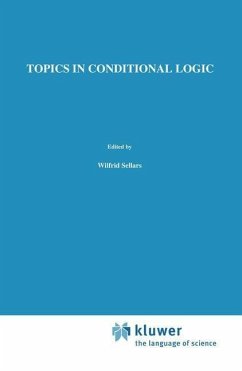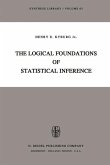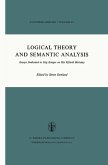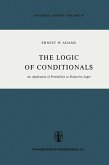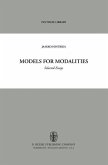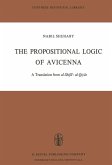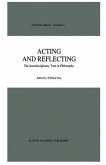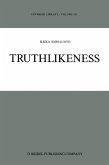Donald Nute
Topics in Conditional Logic (eBook, PDF)
73,95 €
73,95 €
inkl. MwSt.
Sofort per Download lieferbar

37 °P sammeln
73,95 €
Als Download kaufen

73,95 €
inkl. MwSt.
Sofort per Download lieferbar

37 °P sammeln
Jetzt verschenken
Alle Infos zum eBook verschenken
73,95 €
inkl. MwSt.
Sofort per Download lieferbar
Alle Infos zum eBook verschenken

37 °P sammeln
Donald Nute
Topics in Conditional Logic (eBook, PDF)
- Format: PDF
- Merkliste
- Auf die Merkliste
- Bewerten Bewerten
- Teilen
- Produkt teilen
- Produkterinnerung
- Produkterinnerung

Bitte loggen Sie sich zunächst in Ihr Kundenkonto ein oder registrieren Sie sich bei
bücher.de, um das eBook-Abo tolino select nutzen zu können.
Hier können Sie sich einloggen
Hier können Sie sich einloggen
Sie sind bereits eingeloggt. Klicken Sie auf 2. tolino select Abo, um fortzufahren.

Bitte loggen Sie sich zunächst in Ihr Kundenkonto ein oder registrieren Sie sich bei bücher.de, um das eBook-Abo tolino select nutzen zu können.
Zur Zeit liegt uns keine Inhaltsangabe vor.
- Geräte: PC
- ohne Kopierschutz
- eBook Hilfe
- Größe: 16.79MB
Andere Kunden interessierten sich auch für
![The Logical Foundations of Statistical Inference (eBook, PDF) The Logical Foundations of Statistical Inference (eBook, PDF)]() Henry E. Kyburg Jr.The Logical Foundations of Statistical Inference (eBook, PDF)113,95 €
Henry E. Kyburg Jr.The Logical Foundations of Statistical Inference (eBook, PDF)113,95 €![Logical Theory and Semantic Analysis (eBook, PDF) Logical Theory and Semantic Analysis (eBook, PDF)]() Logical Theory and Semantic Analysis (eBook, PDF)73,95 €
Logical Theory and Semantic Analysis (eBook, PDF)73,95 €![The Logic of Conditionals (eBook, PDF) The Logic of Conditionals (eBook, PDF)]() E. W. AdamsThe Logic of Conditionals (eBook, PDF)40,95 €
E. W. AdamsThe Logic of Conditionals (eBook, PDF)40,95 €![Models for Modalities (eBook, PDF) Models for Modalities (eBook, PDF)]() Jaakko HintikkaModels for Modalities (eBook, PDF)113,95 €
Jaakko HintikkaModels for Modalities (eBook, PDF)113,95 €![The Propositional Logic of Avicenna (eBook, PDF) The Propositional Logic of Avicenna (eBook, PDF)]() AvicennaThe Propositional Logic of Avicenna (eBook, PDF)69,95 €
AvicennaThe Propositional Logic of Avicenna (eBook, PDF)69,95 €![Acting and Reflecting (eBook, PDF) Acting and Reflecting (eBook, PDF)]() Acting and Reflecting (eBook, PDF)73,95 €
Acting and Reflecting (eBook, PDF)73,95 €![Truthlikeness (eBook, PDF) Truthlikeness (eBook, PDF)]() I. NiiniluotoTruthlikeness (eBook, PDF)169,95 €
I. NiiniluotoTruthlikeness (eBook, PDF)169,95 €-
-
-
Zur Zeit liegt uns keine Inhaltsangabe vor.
Hinweis: Dieser Artikel kann nur an eine deutsche Lieferadresse ausgeliefert werden.
Dieser Download kann aus rechtlichen Gründen nur mit Rechnungsadresse in A, B, BG, CY, CZ, D, DK, EW, E, FIN, F, GR, HR, H, IRL, I, LT, L, LR, M, NL, PL, P, R, S, SLO, SK ausgeliefert werden.
Hinweis: Dieser Artikel kann nur an eine deutsche Lieferadresse ausgeliefert werden.
Produktdetails
- Produktdetails
- Verlag: Springer Netherlands
- Seitenzahl: 165
- Erscheinungstermin: 6. Dezember 2012
- Englisch
- ISBN-13: 9789400989665
- Artikelnr.: 43981175
- Verlag: Springer Netherlands
- Seitenzahl: 165
- Erscheinungstermin: 6. Dezember 2012
- Englisch
- ISBN-13: 9789400989665
- Artikelnr.: 43981175
- Herstellerkennzeichnung Die Herstellerinformationen sind derzeit nicht verfügbar.
1. The Basic Analysis of Conditionals.- 1.1. Conditionals and Formalization.- 1.2. Hypothetical Deliberation.- 1.3. Some Intuitively Valid Inference Patterns.- 1.4. Formal Semantics for Hypothetical Deliberation.- 1.5. The Weak Conditional Logic W.- 2. Classical vs Non-Classical Logics.- 2.1. Defining the Issues.- 2.2. The Case for Non-Classical Logic.- 2.3. The Non-Classical Logic H.- 2.4. An Evaluation of H.- 3. Alternative Model Theories.- 3.1. Introduction.- 3.2. World-Selection-Function Models.- 3.3. System-of-Spheres Models.- 3.4. Relational Models.- 3.5. Class-Selection-Function Models.- 3.6. Neighborhood Models.- 3.7. Extensional Models.- 3.8. Summary of Equivalence Results.- 3.9. Depth.- 4. Classical Analyses of Conditionals.- 4.1. Introduction.- 4.2. Stalnaker and the Uniqueness Assumption.- 4.3. Lewis and Systems of Spheres.- 4.4. Gabbay and the Role of Consequents.- 4.5. Pollock and Justification Conditions.- 4.6. Adams and Probabilistic Entailment.- 5. Causation and the Temporal Regularity of Subjunctive Conditionals.- 5.1. Introduction.- 5.2. The Counterfactual Analysis of Event Causation.- 5.3. A Miraculous Analysis and a Non-Miraculous Analysis.- 5.4. Lewis's Miraculous Analysis.- 6. Subjunctive Probabilities.- 6.1. A New Species of Conditional Probability.- 6.2. Relative Reasonableness.- 6.3. General Semantics for Subjunctive Probabilities.- 6.4. Subjunctive Probabilities and Probabilistic Entailment.- 6.5. Conditionals, Probability, and Decision Theory.- 7. Algebraic Semantics.- 7.1. Introduction.- 7.2. Algebras.- 7.3. Algebras and Models.- 7.4. Some Independence Results.- 7.5. Non-Classical Logics.- List of Rules and Theses.- Index of Names.- Index of Subjects.
1. The Basic Analysis of Conditionals.- 1.1. Conditionals and Formalization.- 1.2. Hypothetical Deliberation.- 1.3. Some Intuitively Valid Inference Patterns.- 1.4. Formal Semantics for Hypothetical Deliberation.- 1.5. The Weak Conditional Logic W.- 2. Classical vs Non-Classical Logics.- 2.1. Defining the Issues.- 2.2. The Case for Non-Classical Logic.- 2.3. The Non-Classical Logic H.- 2.4. An Evaluation of H.- 3. Alternative Model Theories.- 3.1. Introduction.- 3.2. World-Selection-Function Models.- 3.3. System-of-Spheres Models.- 3.4. Relational Models.- 3.5. Class-Selection-Function Models.- 3.6. Neighborhood Models.- 3.7. Extensional Models.- 3.8. Summary of Equivalence Results.- 3.9. Depth.- 4. Classical Analyses of Conditionals.- 4.1. Introduction.- 4.2. Stalnaker and the Uniqueness Assumption.- 4.3. Lewis and Systems of Spheres.- 4.4. Gabbay and the Role of Consequents.- 4.5. Pollock and Justification Conditions.- 4.6. Adams and Probabilistic Entailment.- 5. Causation and the Temporal Regularity of Subjunctive Conditionals.- 5.1. Introduction.- 5.2. The Counterfactual Analysis of Event Causation.- 5.3. A Miraculous Analysis and a Non-Miraculous Analysis.- 5.4. Lewis's Miraculous Analysis.- 6. Subjunctive Probabilities.- 6.1. A New Species of Conditional Probability.- 6.2. Relative Reasonableness.- 6.3. General Semantics for Subjunctive Probabilities.- 6.4. Subjunctive Probabilities and Probabilistic Entailment.- 6.5. Conditionals, Probability, and Decision Theory.- 7. Algebraic Semantics.- 7.1. Introduction.- 7.2. Algebras.- 7.3. Algebras and Models.- 7.4. Some Independence Results.- 7.5. Non-Classical Logics.- List of Rules and Theses.- Index of Names.- Index of Subjects.
